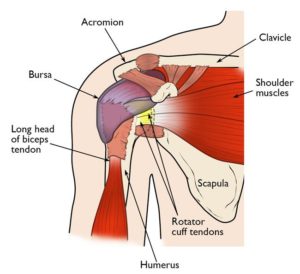
Shoulder Impingement
Shoulder impingement syndrome is caused by the compression or “impingement” of the rotator-cuff tendons in the shoulder, resulting in pain and mobility issues. An injury to the shoulder might also cause it. Manual labourers and athletes who raise their arms frequently overhead (i.e., weightlifters and baseball pitchers) are at the highest risk of acquiring a shoulder impingement. Its development can also be aided by poor posture. A shoulder impingement, if left untreated, can develop into a more serious condition, such as a rotator cuff tear. Physiotherapists at Physiocare in Twyford, Reading can help clients with shoulder impingements reduce pain and increase shoulder motion and strength.
Book Now or Book a Free Phone Consultation
Your Care Pathway with us:
Your clinician will assess and advise you of the most appropriate treatment for you and your condition.
- To book an appointment call our reception line 01189344055, email [email protected] or click the button given below.
- Complete MSK examination and testing.
- Detailed MSK Ultrasound scan.
- Discussion of your treatment plan; Treatment plan may include i.e. advanced treatments for example; Cortisone Injection, Ostenil plus (Hyaluronic injection), or Conservative management like physiotherapy, acupuncture, shockwave therapy and massage.
What Is Shoulder Impingement?
Shoulder impingement syndrome occurs when the rotator-cuff tendons in the shoulder are overworked or damaged, resulting in pain and limited movement. Because the tendons, ligaments, and bursa under the “acromion” can get pinched or squeezed, shoulder impingement syndrome is sometimes known as “sub-acromial” impingement syndrome. The humerus, scapula, and clavicle are the three bones that make up the shoulder. The acromion is a bony projection on the top of the scapula that feels like a hump near the shoulder’s tip.
 The bursa and the rotator cuff tendon are located beneath the acromion. The bursa is a fluid-filled sac that sits beneath the acromion and acts as a cushion between the bone acromion and the rotator cuff tendon. It can get squeezed. Compression and microtrauma to the tendons can cause impingement symptoms. Shoulder impingement syndrome can be caused by a variety of factors, including:
The bursa and the rotator cuff tendon are located beneath the acromion. The bursa is a fluid-filled sac that sits beneath the acromion and acts as a cushion between the bone acromion and the rotator cuff tendon. It can get squeezed. Compression and microtrauma to the tendons can cause impingement symptoms. Shoulder impingement syndrome can be caused by a variety of factors, including:
- Golfing, throwing, racquet sports, and swimming, as well as frequent overhead reaching and lifting, are examples of repetitive overhead actions.
- A fall, for example, can cause the shoulder to become crushed.
- Acromion bony deformities that limit the subacromial space.
- Shoulder osteoarthritis is a condition in which the cartilage in the shoulder is worn away.
- The humeral head moves unnaturally due to a lack of rotator cuff and shoulder blade muscle power.
- The bursa becomes thicker.
- The ligaments in the area are thickening.
- Tightness of the joint capsule, the soft tissue that surrounds the shoulder joint.
Symptoms of Shoulder Impingement
Shoulder impingement can cause the following symptoms:
- Shoulder mobility restriction with concomitant weakness in movement patterns such as reaching overhead, behind the body, or out to the side.
- When moving the arm upward, out to the side, or beside the body, it causes pain in the shoulder.
- When attempting to sleep on the affected side, there is pain and discomfort.
- Throwing actions and other dynamic movement patterns cause pain.
Diagnosis of Shoulder Impingement
At Physiocare Twyford, Reading a physiotherapist will do an assessment and ask you questions about your pain and other symptoms. Your physiotherapist may do shoulder strength and mobility tests, inquire about your job responsibilities and interests, assess your posture, and look for muscle imbalances and weakness in the shoulder and scapular muscles.
To discover which tendons are affected, special tests involving moderate movements of your arm and shoulder may be conducted. Other disorders that could be causing your discomfort, such as bony spurs or deformities, or arthritis, may be detected via X-rays. We use point of care Diagnostic Ultrasound to check inflammation in bursa and tendon tears.
Treatments of Shoulder Impingement
It’s critical to seek treatment for shoulder impingement as soon as possible. Impingement of the tissues in the shoulder can cause secondary diseases such as bursa irritation and rotator-cuff tendonitis or tears.
Shoulder impingement condition can be effectively treated with physiotherapy. You will develop a treatment plan with your physiotherapist at Physiocare Twyford, Reading, that is tailored to your condition and goals. The following items may be included in your individualised treatment plan:
Pain Management
To lessen impingement compression, your physiotherapist will help you recognise and prevent painful motions, as well as rectify aberrant postures.
Manual Therapy
You physiotherapist will mobilise stiff neck, upper back and shoulder joints to help reduce stiffness and pain.
Range-of-Motion Exercises
You’ll learn stretches and exercises to help your shoulder and shoulder blade move properly again so you can reach and lift without pain.
Strengthening Exercises
Depending on your unique situation, your physiotherapist at Physiocare Twyford Reading will assess which strengthening exercises are appropriate for you. Because the rotator-cuff muscles become weak with shoulder impingement syndrome, the head of the humerus tends to slide forward and upward. Strengthening the rotator cuff and scapular muscles can assist move the humerus bone’s head down and back, reducing impingement. To improve your weaker muscles, you might do resistance training activities. Long after your official physiotherapy has ended, you will be given a home-exercise routine to help you maintain your strength.
Patient Education
Learning how to stand properly is a vital component of the recovery process. The tendons at the front of the shoulder, for example, can become impinged when your shoulders slide forward when you bend over a computer. Your physiotherapist in Twyford will work with you to improve your posture and may recommend changes to your workstation and routines.
Functional Training
Your physiotherapist at in Twyford, Reading at Physiocare, will show you how to execute a variety of tasks using good shoulder mechanics when your symptoms improve, such as moving an object onto a shelf or throwing a ball. This training will assist you in resuming pain-free function at work, at home, and while participating in sports.
Injection Therapy For Shoulder Impingement
To book for a steroid injection you can call our normal reception line, 0118 934 4055 or email direct to [email protected] requesting an appointment for an injection. Please include your name, date of birth, your address and GP contact details. You will be sent a form to complete and forward back to us or bring along on the day which gives information about the injection.
Book Now or Book a Free Phone Consultation
Shockwave Therapy for Shoulder Impingement in Twyford
Shockwave therapy is effective treatment for Shoulder Impingement. Learn more at our shockwave page here.



